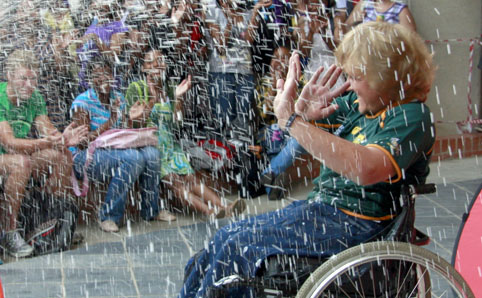|

|
|
Hermann van Heerden
Photo: Gerhard Louw
|
Ten hours. That’s how long Kovsie student Hermann van Heerden held a stationary wheelie in his wheelchair by lifting the front wheels of his wheelchair. The second-year disabled student now stands to get his name in the Guinness World Record Book for the longest stationary wheelie in a wheelchair.
Starting at 03:15 and holding on until 13:15 on Tuesday, 11 October 2011, Hermann achieved what he set out to do. Now he is waiting for the Guinness World Record office to verify his world-record attempt.
The minimum time set for Hermann to achieve a Guinness World Record was four hours, but the B.Ed. student went six hours over this time, wheeling non-stop for ten hours. During this time the Kovsie student had no food or water over his lips, nor was he allowed to go to the bathroom.
Hermann’s Guinness World Record attempt forms part of the ten-year celebrations of the Unit for Students with Disabilities (USD) at the University of the Free State (UFS).
Accomplishing his record attempt, a tired Hermann said the first thing he wanted to do was to eat. Hermann, who was born with spina bifida, a developmental congenital disorder, said he did not have a lot of preparation for his world-record attempt, as he had always been in a wheelchair.
According to the Guinness World Records press office, the closest record to the one Hermann set out to achieve, is for the longest continuous wheelie in a wheelchair. This was achieved by Michael Miller from the USA who covered a distance of 16, 12 km on the rear wheels of his wheelchair.